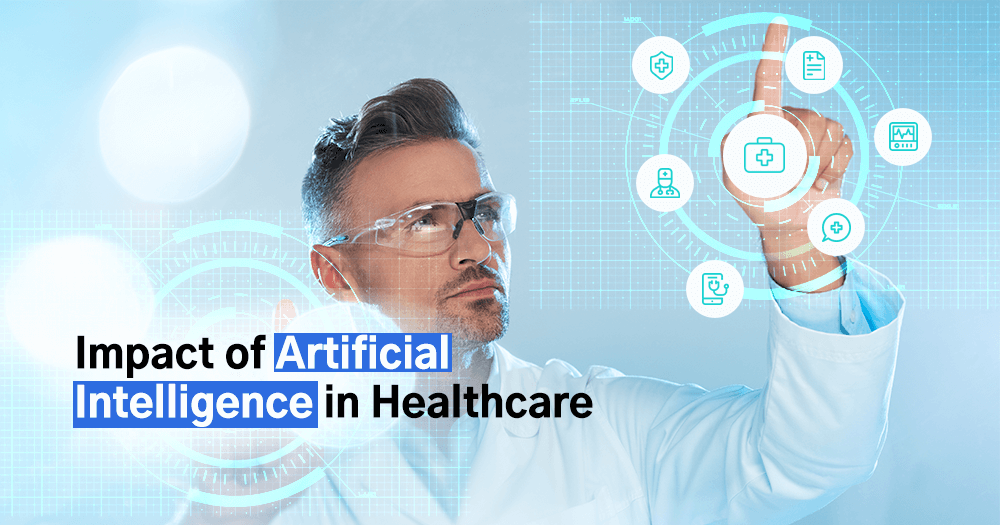How Will AI Make An Impact on Healthcare in 2022?

Medical professionals are finally waking up to advances in artificial intelligence, which is saving lives and improving patient care across the board now. AI is the new way to create the future of healthcare and there’s a lot of potential to leverage it to build new features and experiences.
In this article, we discuss healthcare and AI and what this technology is already doing to ease doctors’ and patients’ lives.
What’s AI Already Doing in Healthcare?
Artificial intelligence is poised to help hospitals create more personalized, precision medicine and improve the quality of care for their patients. With AI, doctors can spend more time diagnosing and offering treatment options and less time reviewing documents and running tests.
AI-Assisted Robotic Surgery
Computer-assisted surgical technology has been evolving with the help of AI for a long time, to the extent that it can now help cut surgical time, increase efficiency and enhance the accuracy of operations. This is a huge step forward as it continues to transform how surgeons can operate.
AI-Assisted Robotic Surgery is a surgical technique that utilizes AI to assist surgeons with remote-guided movements during surgery. The robot’s physical movements are entirely pre-programmed and directed by a physician before the operation. Robotic surgery has been around for many years, but the adoption rate continues to increase and recent advancements are opening doors for the best possible outcomes for patients. The thought was that computers can help reduce the fatigue of surgeons doing menial, repetitive tasks and improve surgical success rates by improving the way surgeons plan their work.
Health Tracking and Wellness Applications
Some of the most promising health tracking applications are being created for wearables and medical devices. Digital health trackers are becoming more prevalent while personal health well-being is something that you need to take care of on your own.
These days, people everywhere are tracking their health. Some meticulously record their exercise and diets, while others use apps or gadgets with fitness or health-related features. But, have you ever thought about tracking your health with the off-the-shelf technology you carry around with you every day? Given this increasing focus on mobile products, it makes sense to look at AI-based health and wellness applications as a hot new space.
Efficient Drug Discovery Process
As we continue to struggle with finding new ways to bring new therapies to market, pharmaceutical companies are turning to computational science to speed up their drug discovery process. What’s more, AI is beginning to have a significant impact on commoditized domains such as drug discovery.
The ability of pharmaceutical companies like Pfizer to develop COVID-19 vaccines has been a tremendous triumph, especially the recorded pace with which they were developed and applied. The advent of new drug development platforms was largely responsible for the success of this innovation acceleration. These platforms allow scientists to use AI and Machine Learning to model protein and cellular interactions rapidly, increasing the speed and accuracy of their research findings.
If AI-enabled drug discovery models are used, they can reduce the time it takes pharmaceutical companies to develop their drugs without costly trials and years of research. By reducing the time to develop a drug, a company can accelerate the time that it takes for an individual patient to get the treatment they need.
The future of AI in drug development is promising and will hopefully help speed up the process of finding new revolutionary treatments.
What to Look Forward to in 2022
With more advancements taking place and more capabilities being built into AI systems, we will see some exciting and promising results in healthcare in the coming years.
AI and Machine Learning in Operating Rooms
In the operating room, AI is being leveraged to reduce the risk of bad decision-making, from ensuring clinical accuracy by monitoring treatment time and details to automating the process of logistic tasks, like collecting and organizing samples taken during surgery.
The use of artificial intelligence and machine learning technology in operating rooms is highly innovative and eagerly anticipated by the medical community. The technology is still new and will be in use by only a few hospitals by the end of the year, but its rise in use will be exponential. Already, AI and machine learning technology have been used to improve operating room workflow, anesthesia and emergency care, and even surgical outcomes.
Analysis of Medical Data
Data is at the heart of artificial intelligence and transformative healthcare. Instead of throwing data at a costly, manual process, AI— the software and process designed to look for “patterns” in data—can cut costs, deliver better care, and transform healthcare.
Machine learning and artificial intelligence are on the rise, credited with ushering in an era of technological innovations in many industries. They’ve also proven to be extremely important tools to analyze health data in areas such as medical research and drug development.
One intriguing prospect is that medical data could be easily analyzed using AI and machine learning technologies repeatedly in order to derive and support medical diagnoses and treatments. With an increasing propensity toward an ‘evidence-based’ approach to patient care as well as the ever-expanding availability of medical data and the adoption of AI and ML, a large-scale analysis of medical data is now available to explore the potential of this new paradigm.
Personalized Medicine
One-size-fits-all is a commonly used expression in the world of pharmaceuticals and treatments. Clinical trials are generally conducted in a way to develop a drug for effectiveness with the highest number of patients that show the smallest number of negative side effects. Now, treatments are more customized and tailored to individual patients’ needs, and are no longer subject to the traditional formulae given to doctors by pharmaceutical companies.
The ability to predict a patient’s likelihood of a certain condition—such as a heart attack or cancer—through modeling software alone is still years from becoming a reality. But as an initial step in this process, doctors can use artificial intelligence to predict a patient’s health status by analyzing their genes.
This technology will radically change the way healthcare is shared, the way appointments are made, the way treatment is managed, the way patients and providers communicate, and the way patients perceive their experience.
Final Word
It’s an exciting time for healthcare technology. A deep learning algorithm can explain what your doctor isn’t telling you, correct your scans with a machine learning algorithm, and answer your medical questions with analytics. With AI and machine learning, surgeons and other medical professionals in operating rooms could leave the difficult work to a machine.
More exciting applications of AI are expected in the healthcare industry, so stay tuned for more interesting info.




